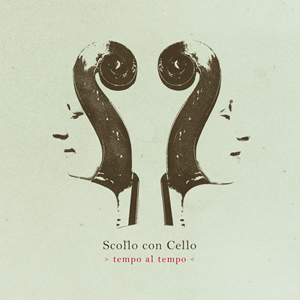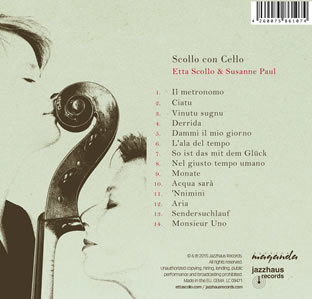 Release: febbraio 2015
Release: febbraio 2015
Copyright: Jazzhaus Records
SCOLLO CON CELLO >TEMPO AL TEMPO<
Tempo al Tempo is the new jewel in the crown of the versatile Sicilian musician Etta Scollo. A wreath in which are embedded works crossing all kinds of music, from pop to opera, jazz and traditional music, genres that merge into each other in a constant search for dialogue with other artistic expressions, especially poetry which through music becomes the key to the most hidden places of the soul. With this work the dialogue continues with a new companion, the cello, an instrument that in the capable hands of Susanne Paul becomes the other voice of a duet, a pas de deux to make a sincere, intense and sometimes ironic homage to the measure of our becoming: Time. Etta’s time is not only the main theme of the 14 songs, but it is also the third party, the sap that beats the rhythm of our lives and at the same time the ubiquitous stone guest, herald of the Death, master of time. Two female voices, two instruments played with poetic intensity, as in Aria, a song inspired by an ancient Sephardic song which tells the impossible love for an ethereal and elusive protagonist, through the passing of the ages and the eternal repetition of history. Voices that become irreverent in Derrida, in which the deconstructivist is deconstructed through a raw and rather tribal musical texture, and its interpretation of the time is freely re-interpreted in a way a bit “dada”.  The same irony is to be found in Monsieur Uno, a piece in the ’30s style where Etta questions the dictatorship of the ego, amoral protagonist of Italian history. Irony that becomes “parabasis” in Acqua sarà (by the writer Daniela Rossi), transfigured and baroque in So ist mit dem Glück (by the poet Anna Boehm) and suddenly introverted and melancholy in the monologue in which the Metronome – the tool symbolising the constant march of time – sings and the cello beats the rhythm for him, in a game bitter-sweet game. In Monate, from an essential and laconic poem of the writer Joachim Sartorius, the reaper appears at the head of a wooden wagon while in two songs inspired by the lyrics of Quasimodo the dialogue between Etta and Susanne becomes lyrical and “high”, same as in the texts of Le Ali del Tempo and Ciatu, both by the Sicilian poet Sebastiano Burgaretta, the first a delicate romance, the second a hymn to life (in Sicilian language Ciatu means the vital breath that embraces everything). In serenade Vinutu, sugnu time is shown in all its relativity and Sendersuchlauf, the only song written, composed and sung by Susanne Paul it becomes the lazy buddy of domestic intimacy where you can finally enjoy the midlife crisis. But it is with the song ‘Nnimini that we can find the key to Tempo al Tempo. The ‘Nnimini are the riddles of the popular tradition of the land of Etta Scollo, interpreters of country wisdom. “They have the distinction of wanting to stimulate the imagination of the listener, with bizarre questions, strong or absurd, behind which always hides the solution.” Says Etta. And it was through this archaic form of poetry that Etta Scollo and Susanne Paul succeed with complicity to condense in a few words the very sense of time, in its perennial actuality.
The same irony is to be found in Monsieur Uno, a piece in the ’30s style where Etta questions the dictatorship of the ego, amoral protagonist of Italian history. Irony that becomes “parabasis” in Acqua sarà (by the writer Daniela Rossi), transfigured and baroque in So ist mit dem Glück (by the poet Anna Boehm) and suddenly introverted and melancholy in the monologue in which the Metronome – the tool symbolising the constant march of time – sings and the cello beats the rhythm for him, in a game bitter-sweet game. In Monate, from an essential and laconic poem of the writer Joachim Sartorius, the reaper appears at the head of a wooden wagon while in two songs inspired by the lyrics of Quasimodo the dialogue between Etta and Susanne becomes lyrical and “high”, same as in the texts of Le Ali del Tempo and Ciatu, both by the Sicilian poet Sebastiano Burgaretta, the first a delicate romance, the second a hymn to life (in Sicilian language Ciatu means the vital breath that embraces everything). In serenade Vinutu, sugnu time is shown in all its relativity and Sendersuchlauf, the only song written, composed and sung by Susanne Paul it becomes the lazy buddy of domestic intimacy where you can finally enjoy the midlife crisis. But it is with the song ‘Nnimini that we can find the key to Tempo al Tempo. The ‘Nnimini are the riddles of the popular tradition of the land of Etta Scollo, interpreters of country wisdom. “They have the distinction of wanting to stimulate the imagination of the listener, with bizarre questions, strong or absurd, behind which always hides the solution.” Says Etta. And it was through this archaic form of poetry that Etta Scollo and Susanne Paul succeed with complicity to condense in a few words the very sense of time, in its perennial actuality.
Tracklist: 1. Il metronomo 2. Ciatu 3. Vinutu sugnu 4. Derrida 5. Dammi il mio giorno 6. L’ala del tempo 7. So ist es mit dem Glück 8. Nel giusto tempo umano 9. Monate 10. Acqua sarà 11. ‘Nnimini 12. Aria 13. Sendersuchlauf 14. Monsieur Uno
Lyrics: booklet graphic
Artistic production: Etta Scollo
Susanne Paul
Susanne Paul grew up in California, in a German-Mexican family, and plays the cello from her early age. As teen-ager she plays flamenco guitar and electric bass in punk bands, but without shelving her classical studies that eventually led her to a serious addiction to cello-jazz. Inspired by all kinds of music (Flamenco, Funk, Rock, Tango, Brazilian and Sicilian music), her compositions combine the virtuosity of different traditions to groove, improvisations and innovative performance techniques. Susanne Paul plays, arranges and composes in numerous bands and musical and theatre projects, appears in more than 20 CDs, LPs und DVDs and has performed in some of the most prestigious theatres and festivals in Europe, Asia, Africa and South America. Among others musicians she collaborated with Uwe Kropinski, Michel Godard, Arkady Shilkloper, String Thing, Georg Breinschmid and MOVE String Quartet. Her recent publications are: Lunaria (with Etta Scollo & Band, CD, Jazzhaus Records 2014), El Camino (Susanne Paul’s MOVE Quartet, CD, Jazz Haus Musik 2013) and Elf Elfen Blues (with the Uwe Kropinski Trio, Jazzwerkstatt 2013) .
Etta Scollo
Etta was born in Catania. In 1983 she wins the first prize at the “Diano Marina Jazz Festival”. At the same time she takes singing lessons at the Conservatory of Vienna working on recordings by the likes of Eddie Lockjaw Davis, Sunnyland Slim and Champion Jack Dupree. In those years she records her first pop hit Oh Darling, the Italian cover of the Beatles’ song which earns her a gold record, and several weeks in the top of the Austrian hit parade. In the ‘90s Etta moves to Hamburg where her music career takes a new direction. She composes soundtracks and songs for several films, the best known of which is I tuoi fiori for the feature film Bad Guy of the South Korean director Kim Ki-Duk. Follow the albums Blue and The White House and the Time. For her collection of songs dedicated to the Sicilian folk singer Rosa Balistreri with the title of Canta Ro’ she is awarded with the “Premio Pino Veneziano 2005”, the “Weltmusikpreis Ruth in 2007”, and the “Premio Rosa Balisteri -Alberto Favara VIII in 2008 “. From that moment Etta dedicates herself to the research and composition of traditional music. Result is the poetic-musical project Il Fiore Splendente, a tribute to Arab poets who lived in Sicily between IX and XII century. To the project took part prominent musicians such as Franco Battiato, Giovanni Sollima, Markus Stockhausen and Nabil Salameh. In 2009, Etta plays the part of Elena in the musical representation of Faust II by J.W. Goethe, translated into music by contemporary composer Karsten Gundermann and performed by the Deutschen Chamber Philharmonic conducted by Alexander Shelley. In the same year Etta re-works the music of Giuseppe Verdi for a modern staging of Rigoletto at the Neukoellner Oper in Berlin. In November 2010, she plays the role of Alice in the Opera Alice in Wonderland at the Teatro Massimo in Palermo. In 2011 she releases the CD Cuoresenza, a musical monologue about love in all its aspects and facets. Her latest CD is the music interpretation of the baroque tale Lunaria by the famous Italian writer Vincenzo Consolo. Etta lives between Berlin and Sicily.
Info:
- Etta Scollo: www. ettascollo.de/
- Susanne Paul : www.groovecello.de/
- Booking: Agentur Maganda – nr@maganda.de


